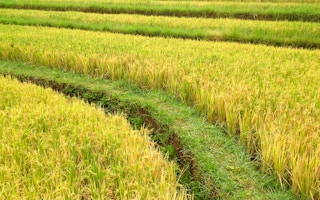Indonesia vowed to uphold the interests of fellow developing nations on agriculture subsidies at the upcoming World Trade Organization (WTO) ministerial summit instead of just playing a good host by brokering a deal.
Trade Minister Gita Wirjawan said Tuesday that Indonesia would continue to throw its weight behind the indefinite time line of a temporary solution expected by the G33 farming alliance.
“We want the interim solution to be in place for as long as possible before a permanent agriculture subsidy solution is agreed upon,” Gita told reporters after a meeting at the Office of the Coordinating Economic Minister.
“As a host we must be able to bridge the interests of developing countries and developed countries, as well as those of least- developed nations and developed countries. But we do embrace the aspirations of developing countries that we should be able to provide subsidies,” added Gita, who will chair the meeting from Dec. 3 to 6 in Bali.
The 46 G33 countries have demanded a change in the threshold of government subsidies from 10 to 15 percent of a country’s total farming output. This will allow them to implement food security programs without penalties even when breaching the subsidy limit.
The new provision will require an amendment to the WTO agriculture agreement, which members realize cannot be completed in Bali. As a consequence, they have agreed on an interim solution, which according to developed nations, particularly the United States, should last four years.
This idea, dubbed a “peace clause”, has met strong opposition from India, a key initiator of the proposal.
Separately, Indonesia Global Justice executive director Riza Damanik warned that Indonesia should not change its bargaining position regarding the peace clause to please developed nations and reach its target as a successful host.
“As the leader of the G33, Indonesia should not lower the demands in the G33 proposal and ask developed countries to offer more flexibility in order to achieve a deal,” Riza said.
“This will be the worst diplomacy ever in our history. It will harm us as well as people in other fellow developing countries,” he said.
WTO talks on a worldwide trade agreement in Geneva reached an impasse due to last-minute backtracking although a deal might still be possible, WTO director general Roberto Azevedo said Tuesday, Reuters reported.
Members disagreed on the duration of the proposed interim solution and issues relating to trade facilitation aimed at streamlining customs procedures.
Agriculture and trade facilitation packages, along with a least-developed countries package, are elements of the Doha Round of trade talks and it is hoped that an agreement on them would breathe a lease of new life on the talks, which has remained at an impasse since 2008.
Azevedo is scheduled to meet ambassadors on Tuesday, Geneva time, at a General Council meeting where they would officially hand over the draft deals to the ninth WTO ministerial summit.
Trade Ministry director general for international trade cooperation Iman Pambagyo said that as the text for deal was not ready, ministers convening in the summit would try to resolve the remaining differences over agriculture and trade facilitation.
Indonesia will back agriculture subsidies proposal

Paling popular
-
![Food_Waste_Market_India]()
Pendapat / Makanan & Pertanian
India’s food waste is turning into an environmental time bomb
India’s colossal food waste problem is both a symptom and a significant accelerator of the climate crisis. -
![solar panels my]() Google will also buy renewable energy for its Malaysian data centres from another solar project in the northern …
Google will also buy renewable energy for its Malaysian data centres from another solar project in the northern … -
![Arthur Joseph Kurup]()
Berita / Polisi & Kewangan
Arthur Joseph Kurup appointed as Malaysia’s new environment minister
He takes the helm of the Natural Resources and Environmental Sustainability ministry following a Cabinet reshuffle, succeeding acting … -
![A city view of Singapore]()
Berita / Karbon & Cuaca
Singapore dominates Southeast Asia’s green startup landscape, report finds
New mapping of climate firms shows region rich in solutions but constrained by grids, finance and coordination. -
![Sustainable innovations of 2025]()
Berita / Polisi & Kewangan
14 sustainable innovations that gave us hope in 2025
From carbon-lite AI to recycled human hair, Eco-Business sifts through the technologies that tackled environmental and social problems … -
![Climate_Inequality_Crosswalk_India]()
Pendapat / Polisi & Kewangan
India’s climate diplomacy must account for domestic inequalities
Economic liberalisation in India has shifted the emissions burden from more equal and developed states to less equal …







